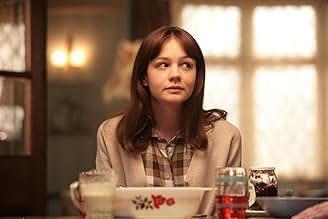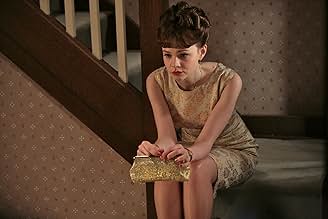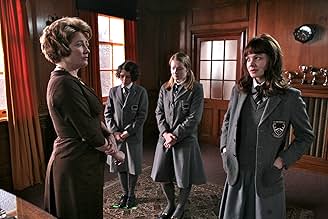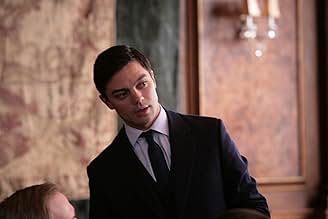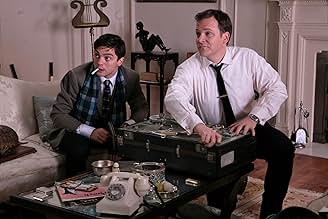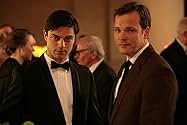Eine Coming-of-Age-Geschichte über ein Teenager-Mädchen im London der 1960er Jahre. Ein doppelt so alter Playboy verändert stellt ihr Leben auf den Kopf.Eine Coming-of-Age-Geschichte über ein Teenager-Mädchen im London der 1960er Jahre. Ein doppelt so alter Playboy verändert stellt ihr Leben auf den Kopf.Eine Coming-of-Age-Geschichte über ein Teenager-Mädchen im London der 1960er Jahre. Ein doppelt so alter Playboy verändert stellt ihr Leben auf den Kopf.
- Regie
- Drehbuch
- Hauptbesetzung
- Für 3 Oscars nominiert
- 36 Gewinne & 96 Nominierungen insgesamt
Kate Duchêne
- Latin Teacher
- (as Kate Duchene)
Empfohlene Bewertungen
The notably fabulous part of director Lone Scherfig's "An Education" is the insightful choice of starting off the Jenny & David story with the revival of Floyd Cramer's lively popular piano piece "On the Rebound," a 1961 hit. It's such a catchy tune that the delightful melody stayed with me as I watch Jenny's grown-up education evolves, enjoying the solid performances from the cast, which included Alfred Molina as Jenny's insecure & assuming father, Cara Seymour is the warm & unassuming Mum, Olivia Williams is the dependable & vulnerable teacher Jenny leans on, and Emma Thompson is the cold & unyielding headmistress - however brief her interactions were. (Thompson's scene with Mulligan somehow reminded me of Suzanne Pleshette facing the principal at the beginning of "Lovers Must Learn" aka "Rome Adventure" circa 1962 of romance master, w-d Delmer Daves.) Dominic Cooper and Rosamund Pike round out the ensemble as the swanky heedless pair of Danny & Helen, accompanying Jenny & David in their escapades & romps.
"An Education" is far from being a Hollywood sugarcoated love story. Based on British journalist-author Lynn Barber's memoir, the screenplay is by Nick Hornby of "About A Boy" and "High Fidelity," who happens to be also from Surrey county in England - Redhill town in southeast region, as Barber - Bagshot town in northwest region. Skillful Danish director Scherfig, whose "Italian for Beginners" 2000 and "Wilbur wants to kill himself" 2002 (my user comments posted on 22 May 2004 at "us.imdb.com/title/tt0329767/usercomments-18") are two worthwhile films to appreciate - she once again delivered a human connection story at once charming and almost slyly edifying. You might even say it's donnish or erudite: step by step accounts and lessons learned for a lovely young 'demoiselle' ready for Oxford. Impressive lead performances from Mulligan - the spunky intelligent Jenny, albeit budding and susceptible, complemented by Sarsgaard's quietly alluring chap of a David. Molina moves right in as Jack, befittingly so for every role he emphatically delivers. Williams is ever so her demure self and restrained as the literary & lonely Miss Stubbs (look forward to her role in w-d Roman Polanski's "The Ghost Writer" 2010, opposite Pierce Brosnan and Ewan McGregor).
It's second outing for Rosamund Pike and Carey Mulligan together, who were both in director Joe Wright's "Pride and Prejudice" 2005 appealing remake of Jane Austen's classic - Pike as Jane Bennet and Mulligan as Kitty, along with Keira Knightley and Matthew Macfadyen.
The film earned a well-deserved nomination for The Best Motion Picture category along with the other nine 2009 productions for the 82nd Oscar Awards. Besides the superb cast, screenplay, direction and set design, editing and all, the soundtrack selections are quite attractive: Floyd Cramer, Mel Torme, Billy Fury, Brenda Lee, Ray Charles, Percy Faith, Vince Guaraldi and several songs in French lyrics, of course, with five music tracks from the film's composer Paul Englishby. Worth checking into if you so inclined. Yes, you will enjoy "An Education" - entertaining and breezy, not without sensible poignancy.
"An Education" is far from being a Hollywood sugarcoated love story. Based on British journalist-author Lynn Barber's memoir, the screenplay is by Nick Hornby of "About A Boy" and "High Fidelity," who happens to be also from Surrey county in England - Redhill town in southeast region, as Barber - Bagshot town in northwest region. Skillful Danish director Scherfig, whose "Italian for Beginners" 2000 and "Wilbur wants to kill himself" 2002 (my user comments posted on 22 May 2004 at "us.imdb.com/title/tt0329767/usercomments-18") are two worthwhile films to appreciate - she once again delivered a human connection story at once charming and almost slyly edifying. You might even say it's donnish or erudite: step by step accounts and lessons learned for a lovely young 'demoiselle' ready for Oxford. Impressive lead performances from Mulligan - the spunky intelligent Jenny, albeit budding and susceptible, complemented by Sarsgaard's quietly alluring chap of a David. Molina moves right in as Jack, befittingly so for every role he emphatically delivers. Williams is ever so her demure self and restrained as the literary & lonely Miss Stubbs (look forward to her role in w-d Roman Polanski's "The Ghost Writer" 2010, opposite Pierce Brosnan and Ewan McGregor).
It's second outing for Rosamund Pike and Carey Mulligan together, who were both in director Joe Wright's "Pride and Prejudice" 2005 appealing remake of Jane Austen's classic - Pike as Jane Bennet and Mulligan as Kitty, along with Keira Knightley and Matthew Macfadyen.
The film earned a well-deserved nomination for The Best Motion Picture category along with the other nine 2009 productions for the 82nd Oscar Awards. Besides the superb cast, screenplay, direction and set design, editing and all, the soundtrack selections are quite attractive: Floyd Cramer, Mel Torme, Billy Fury, Brenda Lee, Ray Charles, Percy Faith, Vince Guaraldi and several songs in French lyrics, of course, with five music tracks from the film's composer Paul Englishby. Worth checking into if you so inclined. Yes, you will enjoy "An Education" - entertaining and breezy, not without sensible poignancy.
In the cinema certain historical periods have become associated with a particular set of ideas. The 1960s represent change, progress and excitement whereas the 1950s are frequently regarded as a period of stifling social conformity. Of course, the "swinging sixties" did not necessarily start to swing on 1st January 1960, and in retrospect the first few years of the decade seem to have more in common with the conformist fifties than with the "swinging London" era of the later sixties. Certainly, many young people during this period regarded London as a dull, conservative place, and looked eagerly to foreign cities, especially Paris, as being more exciting and radical. There was an enthusiasm for everything French- French philosophy, French literature, French cinema, French fashions, even French jazz and French cigarettes. This Francophilia doubtless included elements of wishful thinking- De Gaulle's Fifth Republic was a more conservative place than many Britons realised- but it was nevertheless an influential phenomenon. It is a phenomenon explored in Julian Barnes' novel "Metroland" (later filmed), and also in this film.
The main character is Jenny, a teenage schoolgirl living in the London suburb of Twickenham in 1961. Jenny is highly intelligent, and is studying hard with a view to taking the entrance exams to Oxford University. She is not, however, really sure why she wants to go to Oxford, except that she is being pushed to do so by her parents who feel that university is the best place for her to meet a wealthy husband.
Jenny's life changes when she meets a handsome and charming older man named David. They quickly become close friends and begin dating. David is clearly wealthy, and claims to be an art dealer and property developer. More important to Jenny, however, is his knowledge of culture. He is well up with all the latest intellectual and artistic fashions from France and takes her to concerts and jazz clubs. What really impresses her is that he takes her to Paris. Eventually, David proposes to Jenny and she accepts and drops out of school without taking her A-levels, her Oxford ambitions abandoned.
Many parents would be worried about the idea of their sixteen-year-old daughter being romanced by a thirty-something man, especially if his influence leads her to neglect her education, but Jenny's parents, especially her complacent, Philistine father, seem strangely unconcerned. His argument is that as Jenny has now found a wealthy suitor there will be no need for her to use Oxford as a dating agency. His one objection to David as a son-in-law seems to be that he is Jewish. (Anti-Semitism was unfortunately widespread in British society at this period). Yet it is obvious to the audience that there is a darker side to David's character. His business methods are, to say the least, not beyond reproach (the character may have been based upon the notorious slum landlord Peter Rachman) and he never takes Jenny to his home, always meeting her in a luxurious flat belonging to his friend and business partner Danny. Eventually, even Jenny herself begins to suspect that David is not all he seems.
The title "An Education" can be understood on two levels. As a coming-of-age drama it narrates Jenny's metaphorical "education" in the wider sense of learning lessons about life. Yet it obviously also deals with her education in the narrower, literal sense of the word. It raises similar issues to another great British film, "Educating Rita", namely whether it is formal academic education or informal education to be gained in the outside world which is the more valuable. Jenny drops out of school because she believes that she can better acquire knowledge, both of high culture and of the ways of the world, through her life with David than through academic study. (Jenny's vision of her future life envisages her living with David in Paris on the Rive Gauche, reading Sartre, smoking Gauloises and going to the cinema to see the latest productions of the Nouvelle Vague). It seems hard to blame her for this conclusion, given that in the film the main advocate of the life academic is her headmistress, an intellectual snob and virulent anti-Semite ("The Jews killed Our Lord!") who serves as a reminder that an educated mind is not necessarily an open one. It is only when she becomes disillusioned with David that Jenny starts to reassess her priorities.
Her performance in the lead role has led to Carey Mulligan being hailed as the "new Audrey Hepburn", although the main point of resemblance seems to be that at one point in the film Jenny sports (as many young women doubtless did in the early sixties) a Hepburn-style hairdo. Nevertheless, on the basis of this performance Mulligan would appear to be a highly promising star in the making, perhaps the new Keira Knightley. Although she is actually 24, she always seems entirely believable as a naive young teenager. Other good contributions come from Peter Sarsgaard as the smooth, reptilian David, Alfred Molina as Jenny's comical, blustering father, Rosamund Pike as Danny's airheaded mistress Helen and Emma Thompson in an excellent cameo as the obnoxious headmistress.
Period drama is something the British cinema often does well, and "An Education" falls within this tradition, even though it has a Danish director, Lone Scherfig. 2009 has already seen two good British costume dramas, "The Young Victoria" and "Dorian Gray", but "An Education" is an even better one. It is not only a study of a girl on the verge of womanhood, but also an exploration of issues such as social class, racism and the value of education. One of the best British films of recent years. I hope that the Academy will remember it when next year's Oscars are being handed out. 9/10
The main character is Jenny, a teenage schoolgirl living in the London suburb of Twickenham in 1961. Jenny is highly intelligent, and is studying hard with a view to taking the entrance exams to Oxford University. She is not, however, really sure why she wants to go to Oxford, except that she is being pushed to do so by her parents who feel that university is the best place for her to meet a wealthy husband.
Jenny's life changes when she meets a handsome and charming older man named David. They quickly become close friends and begin dating. David is clearly wealthy, and claims to be an art dealer and property developer. More important to Jenny, however, is his knowledge of culture. He is well up with all the latest intellectual and artistic fashions from France and takes her to concerts and jazz clubs. What really impresses her is that he takes her to Paris. Eventually, David proposes to Jenny and she accepts and drops out of school without taking her A-levels, her Oxford ambitions abandoned.
Many parents would be worried about the idea of their sixteen-year-old daughter being romanced by a thirty-something man, especially if his influence leads her to neglect her education, but Jenny's parents, especially her complacent, Philistine father, seem strangely unconcerned. His argument is that as Jenny has now found a wealthy suitor there will be no need for her to use Oxford as a dating agency. His one objection to David as a son-in-law seems to be that he is Jewish. (Anti-Semitism was unfortunately widespread in British society at this period). Yet it is obvious to the audience that there is a darker side to David's character. His business methods are, to say the least, not beyond reproach (the character may have been based upon the notorious slum landlord Peter Rachman) and he never takes Jenny to his home, always meeting her in a luxurious flat belonging to his friend and business partner Danny. Eventually, even Jenny herself begins to suspect that David is not all he seems.
The title "An Education" can be understood on two levels. As a coming-of-age drama it narrates Jenny's metaphorical "education" in the wider sense of learning lessons about life. Yet it obviously also deals with her education in the narrower, literal sense of the word. It raises similar issues to another great British film, "Educating Rita", namely whether it is formal academic education or informal education to be gained in the outside world which is the more valuable. Jenny drops out of school because she believes that she can better acquire knowledge, both of high culture and of the ways of the world, through her life with David than through academic study. (Jenny's vision of her future life envisages her living with David in Paris on the Rive Gauche, reading Sartre, smoking Gauloises and going to the cinema to see the latest productions of the Nouvelle Vague). It seems hard to blame her for this conclusion, given that in the film the main advocate of the life academic is her headmistress, an intellectual snob and virulent anti-Semite ("The Jews killed Our Lord!") who serves as a reminder that an educated mind is not necessarily an open one. It is only when she becomes disillusioned with David that Jenny starts to reassess her priorities.
Her performance in the lead role has led to Carey Mulligan being hailed as the "new Audrey Hepburn", although the main point of resemblance seems to be that at one point in the film Jenny sports (as many young women doubtless did in the early sixties) a Hepburn-style hairdo. Nevertheless, on the basis of this performance Mulligan would appear to be a highly promising star in the making, perhaps the new Keira Knightley. Although she is actually 24, she always seems entirely believable as a naive young teenager. Other good contributions come from Peter Sarsgaard as the smooth, reptilian David, Alfred Molina as Jenny's comical, blustering father, Rosamund Pike as Danny's airheaded mistress Helen and Emma Thompson in an excellent cameo as the obnoxious headmistress.
Period drama is something the British cinema often does well, and "An Education" falls within this tradition, even though it has a Danish director, Lone Scherfig. 2009 has already seen two good British costume dramas, "The Young Victoria" and "Dorian Gray", but "An Education" is an even better one. It is not only a study of a girl on the verge of womanhood, but also an exploration of issues such as social class, racism and the value of education. One of the best British films of recent years. I hope that the Academy will remember it when next year's Oscars are being handed out. 9/10
I was 14 years old in 1961, just a couple of years younger than the girl here. A couple of years later, I too was involved with an older married man. (But not to worry, the next year I entered hippiedom and all was very, very different.) What I'm trying to say is, "Been there, done that"
except in my case it was Evansville, Indiana and not London. Too bad. Anyway, I was not as sophisticated as this 16 year old (neither was he, by the way) but I reveled in the mystery and adventure of the adult world
also the lies and deceit. The thing is, now that I'm an Aging Hippy, Retired, the age difference of the girl/man couple disturbed me. I was also disturbed by the acceptance of the parents. The movie was well made, the actors do a terrific job, and it made me think. My reaction is my own personal bugaboo. Just thought I'd put it out there.
In early 1960s England, a 16-year old schoolgirl becomes infatuated with a man nearly twice her age. The best thing about this handsomely made if unoriginal drama is the winning performance by Mulligan, a radiant young actress. American Sarsgaard seems an odd choice to play her British suitor, but he brings an appropriate creepiness to the role. Also notable are Molina, Williams, and Thompson. Although based on a memoir, it is hard to believe that the young lady's parents would be so gullible and idiotic as to let her go out of town for overnight stays with an older man they know nothing about. The screenplay is somewhat plodding, leading to a clichéd ending.
An Education works little wonders even if it's an imperfect film. There's much to recommend about it as this season's British indie movie with something different going for it. It's something about its character and the circumstances of what happens to her that's fascinating: sixteen year old Jenny (Carey Mulligan), a smart girl with a love for Parisian culture and music and movies, is pressured to get into Oxford, not even so much for the English degree to teach English (or Latin as case might be) but for the status. Enter in David (Sarsgard), an older man who rides up to Jenny one rainy day and offers her a ride home. From then on its a romantic affair between the two, where he whisks her to wonderful jazz clubs and auctions, and even, eventually, to Paris. A twist happens late in the film that turns all of this upside down, but I dare not reveal it here.
What makes it interesting is not so much the teen girl with adult male aspect (on that side of the coin it's like a British version of Manhattan only told from the girl's point of view and a less conflicted man in the situation), but how the relationship is perceived by her parents and peers and teachers. This isn't some illicit affair to be kept under wraps, but something that (refreshingly for a movie at least) is out in the open, and with that comes the awkward stares and upturned eyebrows, and as well the charm that David exudes on Jenny's parents. It's as much a film about romance as it is about class, about how Jenny fits in or could fit in to a society in Britain in 1961, and how David fits in and how her parents see her fitting in (or, for that matter, how David fits others in as a property re-seller to the black community). And of course the aspect of Oxford vs. getting married, the only options for Jenny at a crucial point.
And now for the rest of the good and... well, not so much bad but just underwhelming. The good is this newcomer Carey Mulligan. One can't wait but to see her in other films; she's a natural at playing a great range of emotions required for this complex character, a girl who thinks and acts and talks like a woman but yet still sort of a girl at the same time (see Jenny's trip to Paris for that). Supporting players like Molina and Williams are also very good, giving their scenes the proper 'umph' needed and gravitas in some key scenes. Sarsgaard fares a little less well with a good performance but less than convincing accent. The screenplay by Nick Nornby (for once he's adapting a book!) and it's written with a natural ear for the way characters at that time might speak. The direction is clear and concise and just handsome enough to be competent. The last ten minutes, however, seem rushed on all of the ends of the storytelling, after such a good momentum has been building on the crest of Jenny's future.
It's a very good movie where we care about the characters and see some life lessons learned with (usually) unsentimental results. It's a tragic-comic crumpet of a movie, dear and serious, amusing but very telling about human nature. 7.5/10
What makes it interesting is not so much the teen girl with adult male aspect (on that side of the coin it's like a British version of Manhattan only told from the girl's point of view and a less conflicted man in the situation), but how the relationship is perceived by her parents and peers and teachers. This isn't some illicit affair to be kept under wraps, but something that (refreshingly for a movie at least) is out in the open, and with that comes the awkward stares and upturned eyebrows, and as well the charm that David exudes on Jenny's parents. It's as much a film about romance as it is about class, about how Jenny fits in or could fit in to a society in Britain in 1961, and how David fits in and how her parents see her fitting in (or, for that matter, how David fits others in as a property re-seller to the black community). And of course the aspect of Oxford vs. getting married, the only options for Jenny at a crucial point.
And now for the rest of the good and... well, not so much bad but just underwhelming. The good is this newcomer Carey Mulligan. One can't wait but to see her in other films; she's a natural at playing a great range of emotions required for this complex character, a girl who thinks and acts and talks like a woman but yet still sort of a girl at the same time (see Jenny's trip to Paris for that). Supporting players like Molina and Williams are also very good, giving their scenes the proper 'umph' needed and gravitas in some key scenes. Sarsgaard fares a little less well with a good performance but less than convincing accent. The screenplay by Nick Nornby (for once he's adapting a book!) and it's written with a natural ear for the way characters at that time might speak. The direction is clear and concise and just handsome enough to be competent. The last ten minutes, however, seem rushed on all of the ends of the storytelling, after such a good momentum has been building on the crest of Jenny's future.
It's a very good movie where we care about the characters and see some life lessons learned with (usually) unsentimental results. It's a tragic-comic crumpet of a movie, dear and serious, amusing but very telling about human nature. 7.5/10
Wusstest du schon
- WissenswertesThe creative team was initially worried about casting the 22-year-old Carey Mulligan in the role of a 16-year-old but was convinced by her screentest. Rosamund Pike reportedly really wanted the small part of Helen because "no one ever lets me be funny."
- PatzerWhen Jenny finally passes her A levels, she mentions grades. The film is set in 1961 - A level grades were first introduced in 1963. Although,when she's studying at home, it is implied that a significant amount of time passes, it is unlikely to have taken her beyond 1962 when, essentially, you either passed or failed GCE exams.
- Crazy CreditsThe opening credits are shown against a background of animated chalk-like drawings, all illustrating various stages and segments of "an education," although not sequentially.
- VerbindungenFeatured in Oscar 2009 - Die Academy Awards (2009)
- SoundtracksSmoke Without Fire
Written by Duffy and Bernard Butler
Performed by Duffy
Courtesy of A&M/Polydor Records (UK), Mercury Records (US)
Top-Auswahl
Melde dich zum Bewerten an und greife auf die Watchlist für personalisierte Empfehlungen zu.
- How long is An Education?Powered by Alexa
- Can anyone tell us about David's car: make, model, year, etc.? It was very singular looking.
Details
- Erscheinungsdatum
- Herkunftsländer
- Offizieller Standort
- Sprachen
- Auch bekannt als
- Enseñanza de vida
- Drehorte
- Bloomsbury Service Station - 6 Store Street, Bloomsbury, London, England, Vereinigtes Königreich(Jenny finds the letter)
- Produktionsfirmen
- Weitere beteiligte Unternehmen bei IMDbPro anzeigen
Box Office
- Budget
- 7.500.000 $ (geschätzt)
- Bruttoertrag in den USA und Kanada
- 12.574.914 $
- Eröffnungswochenende in den USA und in Kanada
- 159.017 $
- 11. Okt. 2009
- Weltweiter Bruttoertrag
- 26.096.852 $
- Laufzeit1 Stunde 40 Minuten
- Farbe
- Sound-Mix
- Seitenverhältnis
- 2.35 : 1
Zu dieser Seite beitragen
Bearbeitung vorschlagen oder fehlenden Inhalt hinzufügen








